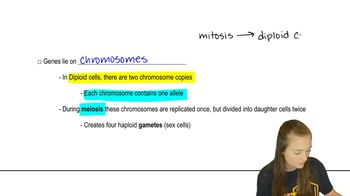Here are the essential concepts you must grasp in order to answer the question correctly.
Genetic Inheritance
Genetic inheritance refers to the process by which traits and characteristics are passed from parents to offspring through genes. This includes both dominant and recessive alleles that can influence the likelihood of developing certain conditions, including cancer. Understanding this concept is crucial for distinguishing between direct inheritance of cancer and the inheritance of predisposition.
Recommended video:
Cancer as a Genetic Disease
Cancer is often described as a genetic disease because it results from mutations in genes that control cell growth and division. These mutations can be inherited (germline mutations) or acquired (somatic mutations). Recognizing that cancer can arise from both inherited and non-inherited mutations helps clarify the difference between having cancer itself and having a genetic predisposition to develop it.
Recommended video:
Predisposition vs. Direct Inheritance
Predisposition to cancer means that an individual has a higher likelihood of developing cancer due to inherited genetic factors, but it does not guarantee that they will get cancer. In contrast, saying that cancer is inherited implies that the disease itself is passed down, which is not accurate for most cancers. Understanding this distinction is essential for discussing genetic risk factors and their implications for individuals and families.
Recommended video:
 Verified step by step guidance
Verified step by step guidance Verified video answer for a similar problem:
Verified video answer for a similar problem:



 9:51m
9:51m